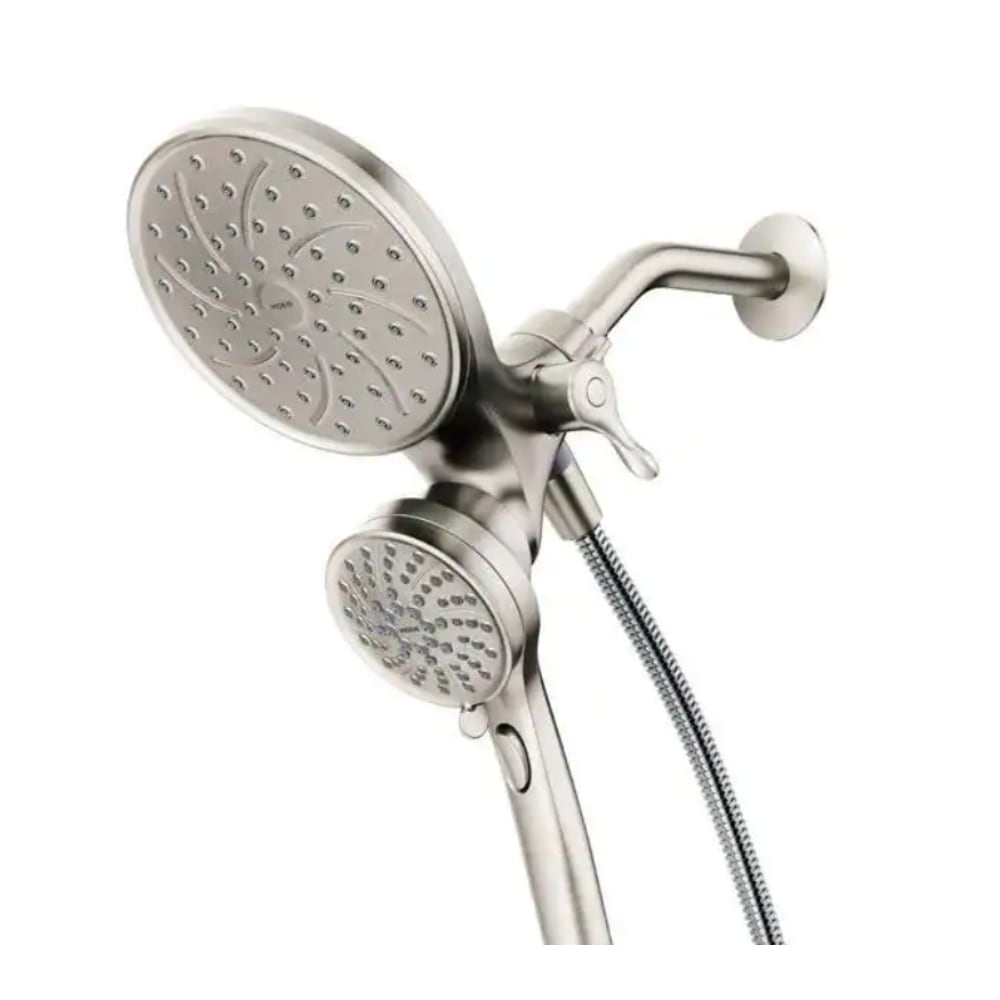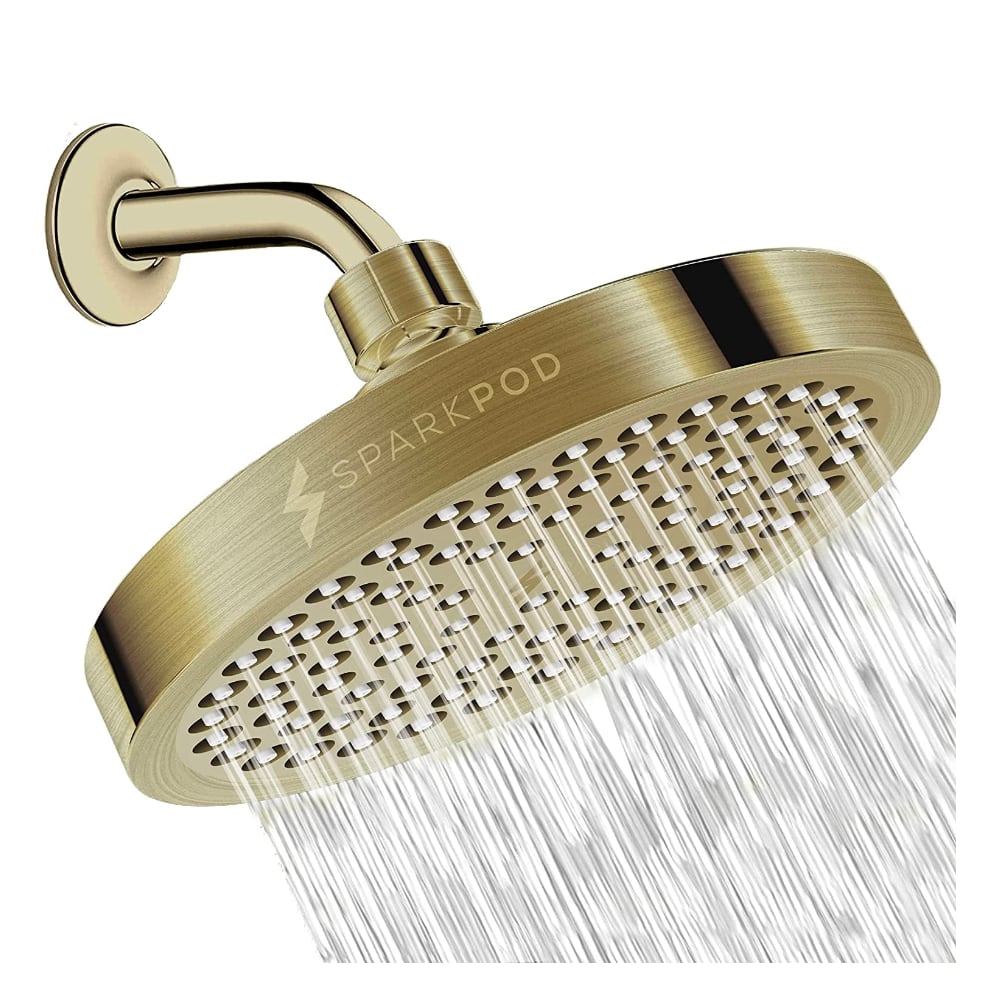When shopping for a new shower head, one of the most important considerations is the finish – or how the shower head looks and from which material it was made.
Today, we’ll look at five different shower head finishes and some key considerations to keep in mind when making your purchase.
Types of Shower Head Finishes
1. Chrome Plated

If there is one material synonymous with shower heads, it’s chrome. Chrome-plated finishes are the most common. This easy-to-clean and affordable finish allows it to look like new even after several years of use.
Maintenance is easy; all it takes is a quick wipe down with any standard household cleaner. Despite the metal design, chrome is relatively inexpensive, making it a suitable choice for most homes.
However, one downside to a chrome-plating is that it should be replaced immediately if it either cracks or chips, often due to the wide-ranging temperature fluctuations experienced within a bathroom.
Lastly, if you neglect to clean the shower head, it will be prone to showing unsightly water spots rather quickly.
2. Stainless Steel

Looking for that ‘buy-it-for-life’ purchase? Then there is no better option than stainless steel.
Stainless steel is naturally rust and stain-resistant, which is especially helpful if you worry about harsh chemicals or hard water in your pipes corroding your shower head.
Shower heads from this material can easily last up to 30 years without issue.
Related: How Often Should you Replace a Shower Head?
Finishes on stainless steel can vary from brand to brand and may feature a shiny mirror-like finish to a more matte treatment. The latter will be less likely to show water spots – making it preferred by those who clean their shower fixtures infrequently.
Unlike other materials, stainless steel shower heads often cost a premium.
3. Brushed Nickel

Opposite stainless steel, you’ll find brushed nickel.
Brushed nickel is an increasingly popular choice as most shower heads with this finish have a neutral gray color paired with a matte texture.
Like stainless steel, nickel is resistant to corrosion and holds up against harsh water. Depending on the treatment, water spots will likely not be as apparent as on shinier finishes.
One notable downside to this finish is if anyone in your family has a nickel allergy. Also, getting a handheld shower head with this finish is not ideal, as it could cause an allergic reaction.
Lastly, brushed nickel costs a bit more than some of its counterparts.
4. Brass

Brass is the finish of choice for those bohemian chic or antique-style bathrooms with a bit of design flair. The warm and golden hue of brass can soften the atmosphere – making any bathroom your private oasis.
Brass has been used in plumbing fixtures for years and remains a time-tested material. If you regularly upkeep this shower head, you’ll likely never need to replace it.
However, one downside to brass compared to other metal finishes is that it is susceptible to tarnishing. So be sure to clean it regularly for the best results.
5. Plastic

Watching your wallet? Then consider a budget-friendly plastic shower head. Plastic shower heads are characterized by their lightweight feel and typically white color.
Of course, the tradeoff with this finish is that it is the least environmentally friendly material.
Additionally, plastic will degrade over time and show signs of wear. Whether it be through leaky connections, chipping of the seams, or just general poor performance of the shower head itself.
We only recommend this type of finish if it’s a temporary installation (perhaps an RV, apartment, etc.) or if you simply don’t want to spend more than $20 on your next shower head – but it is worth noting that you will have to replace this finish more frequently than its metal counterparts.
Considerations
When deciding which finish is best for your shower head, there are a lot of options to weigh, such as the following:
- Long-Term Durability: Metal will always remain the most durable of all materials and can last for several decades before needing to be replaced. Most plastic shower heads need to be replaced once every five years, depending on water quality, usage, and maintenance.
- Ease of Cleaning: Matte finishes are less likely to show water spots, deposits, and more – making this easier to clean only because the signs that haven’t been cleaned are less obvious. Plastic or chrome-like finishes show water spots that need to be wiped down regularly if you don’t want them to be noticeable.
- Aesthetics: What type of look are you going for in your bathroom? Something clean and modern, or perhaps more traditional? No matter what, there is a finish and color that will suit your needs. When in doubt, match the finish color to the rest of your bathroom fixtures.
- Environmental Impact: This one is relatively self-explanatory. Metal is the most environmentally friendly option, while plastic is the least. If you are concerned about your shower head’s impact on the environment, then you should consider a metal finish.
- Budget: Metal shower heads will cost more, yet need to be replaced less frequently (if ever). Plastic, on the other hand, is significantly cheaper but requires regular replacement. For reference, some metal shower heads will easily cost more than $100, whereas plastic shower heads can be found for under $20. Consider your budget and other factors when deciding how much you want to spend on your next shower head.
Related: Metal vs. Plastic Shower Heads
Conclusion
It’s important to weigh your options and consider what aspects of each shower head finish align with your needs and expectations for yourself and your bathroom closest. For example, do you need the most cost-effective shower head or the most long-lasting shower head? There is no one right answer for which shower head finish is the best overall; it’s dependent on your situation.
